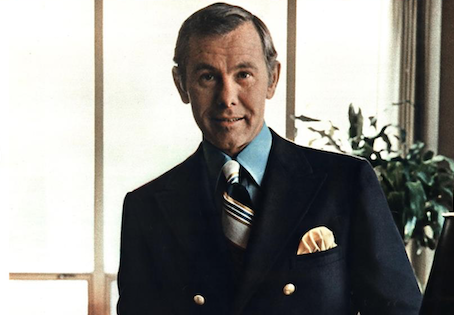In the late ’70s, Kenneth Tynan wrote a handful of long, entertaining profiles for The New Yorker—later collection in Show People. It’s our good fortune that the good folks down at Conde Nast see fit to make one of those stories free online.
So, ifyou’ve never read “Fifteen Years of the Salto Mortale,” Tynan’s 1978 profile of Johnny Carson, dig in, it’s a good one:
“Johnny Carson on TV,” one of his colleagues confided to me, “is the visible eighth of an iceberg called Johnny Carson.” The remark took me back to something that Carson said of himself ten years ago, when, in the course of a question-and-answer session with viewers, he was asked, “What made you a star?” He replied, “I started out in a gaseous state, and then I cooled.” Meeting him tête-à-tête is, as we shall see later, a curious experience. In 1966, writing for Look, Betty Rollin described Carson off camera as “testy, defensive, preoccupied, withdrawn, and wondrously inept and uncomfortable with people.” Nowadays, his off-camera manner is friendly and impeccably diplomatic. Even so, you get the impression that you are addressing an elaborately wired security system. If the conversation edges toward areas in which he feels ill at ease or unwilling to commit himself, burglar alarms are triggered off, defensive reflexes rise around him like an invisible stockade, and you hear the distant baying of guard dogs. In addition to his childhood, his private life, and his income, these no-trespassing zones include all subjects of political controversy, any form of sexual behavior uncountenanced by the law, and such matters of social concern as abortion and the legalization of marijuana. His smile as he steers you away from forbidden territory is genial and unfading. It is only fair to remember that he does not pretend to be a pundit, employed to express his own opinions; rather, he is a professional explorer of other people’s egos. In a magazine article that was published with annotations by Carson, Fred de Cordova wrote, “He’s reluctant to talk much about himself because he is essentially a private person.” To this Carson added a marginal gloss, intended as a gag, that had an eerie ring of truth: “I will not even talk to myself without an appointment.”
